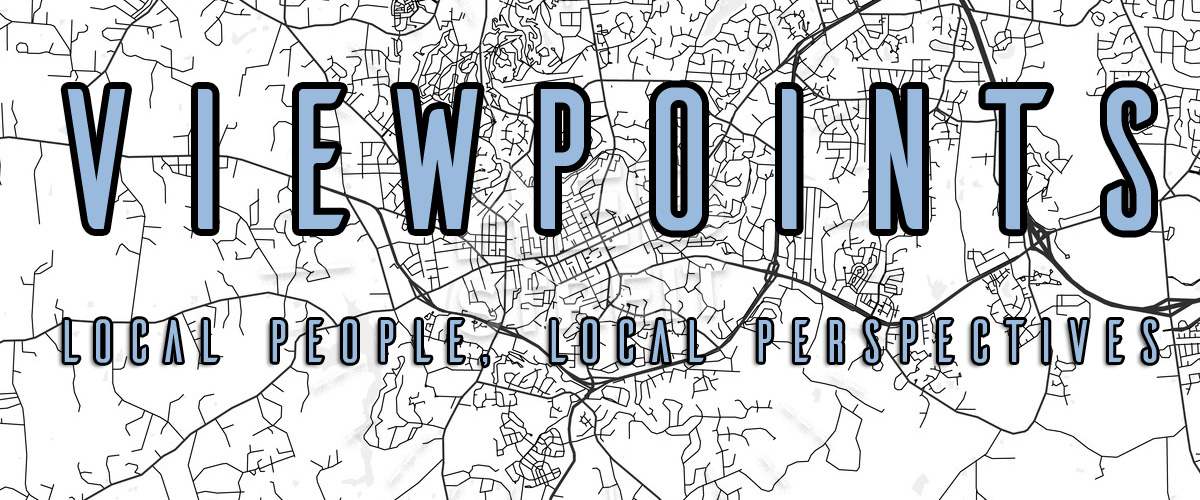
“Viewpoints” is a place on Chapelboro where local people are encouraged to share their unique perspectives on issues affecting our community. If you’d like to contribute a column on an issue you’re concerned about, interesting happenings around town, reflections on local life — or anything else — send a submission to viewpoints@wchl.com.
Empowering Independents Can Stabilize Our Democracy
A perspective from T. Andrew Dykers
The great state of North Carolina, like many others, is battling over who controls drawing our district maps for NC State House and Senate, as well as the US Congress. For the upcoming 2022 elections, NC will use maps which were ultimately deemed appropriate by the NC Supreme Court, not the NC legislature. This battle is a little confusing because it’s a dispute between branches of government and political parties involving both state and federal legal systems. It’s also confusing because it involves the un-intuitive word “gerrymandering.” But for the purpose of this article, I’m going to use the term “rigged” map instead of “gerrymandered” to describe the practice of drawing heavy-handed maps that favor one political party over another, and I’m going to discuss how empowering Independents (NC’s largest political group) is key to solving this and other critical problems.
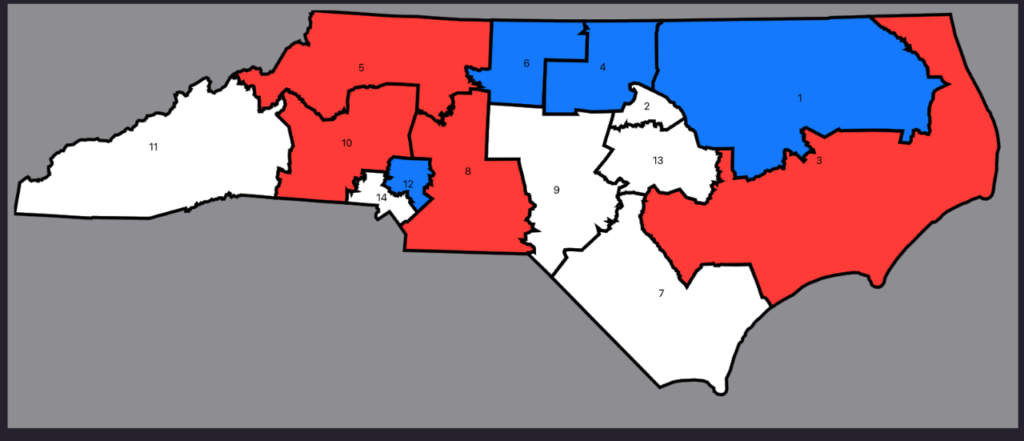
The largest political group (Independents, Democrats, Republicans) within each of North Carolina’s newly drawn US Congressional districts. (Image created by Richard Ward, using voter registration data from the NC State Board of Elections and the map available from the NC Legislative site.)
I’m generally happy about the new maps because they are more in-line with the political makeup of our state (as it relates to Democrats and Republicans). But the fight over control is not finished. The NC legislative branch, led by Republicans, has an argument based on the Elections Clause of the US Constitution which instructs state legislatures to handle the “time, place, and manner” of elections. The US Supreme Court has decided to allow the new maps to govern the upcoming 2022 elections (the logic being that we are too close to election season for any more change or uncertainty). But there are strong indications the US Supreme Court intends to hear this issue of “map control” in the very near future. Given the political makeup of the Court, there is reason to believe the Republican led NC legislative branch may win the impending US Supreme Court debate.
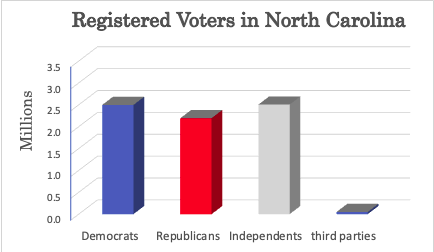
Independents have passed Dems and Reps to become NC’s largest political category (Image created by T. Andrew Dykers using data from the NC State Board of Elections.)
I predict frustrations will continue to rise as the two-party dog chases its tail. If the Republican led legislative branch wins the fight at the US Supreme Court level, NC will likely revert to maps which disproportionately favor Republicans even though Republicans are the smallest of the “big three” political affiliations in our state. Imagine how upset Democrats will be if they win control of the NC legislature under the new maps only to have those gains eviscerated by a US Supreme Court ruling that allows for politically rigged maps to rule the land. On the other hand, if the Republican led NC legislative branch loses at the US Supreme Court level they will go back to their base and rile them up in a big way saying, “Those judges don’t care about the Constitution! This is judicial over-reach! The will of the people has been violated! Elections have consequences!” (Or worse).
Empowering Independents can diffuse and stabilize our red vs. blue conflict.
I hold the US Constitution in the highest regard and have taken a deeply sincere oath to uphold it, but its failure to speak to the issue of political parties is a problem. The US Constitution instructs us that legislative district maps will be drawn every ten years based on the census. It tells us state legislatures are in control of the “time, place, and manner” of elections. So, it seems reasonable (and NC Republicans will say it is obvious) that making the district maps should be part of the “time, place, and manner” duties of the state legislature. But when you look at the whole Constitution you can see the ”time, place, and manner” power was/is not intended to allow state legislatures to do whatever the heck they want or to exclude whomever the heck they want.
In addition to the Equal Protection Clause of the 14th Amendment, which is supposed to make certain everyone plays by the same rules, the US Constitution also, for example, tells us that we must be a citizen of a certain age to run for Congress. These broad parameters (age and citizenship) create the implicit instruction that elections are intended to be inclusive, not exclusive, and demonstrate how the Elections Clause is not a license for the states to do whatever they want. The “time, place, and manner” power of the Elections Clause is a Constitutional instruction for state legislatures to handle the logistics of elections, including drawing maps, but the Elections Clause cannot reasonably be construed to allow for laws (or maps) which exclude large swaths of voters without being subject to judicial review.
Since there is no mention of political parties in the US Constitution, there is of course also no mention of politically “rigged” maps either. Article V of the US Constitution provides methods for fixing the problem with an amendment, but those pathways have essentially become unnavigable due to the division between Democrats and Republicans. Congress could write a law setting proper nonpartisan guidelines for the fairness of legislative district maps, but they have not done so. Democrats in the current Congress address the issue of rigged maps in the For the People Act, but unfortunately the issue of map drawing (redistricting) is buried among dozens of other electoral issues. Democratic leadership has so far failed to isolate the subject, educate the public, and either fix the problem or at least force Republicans to cast a vote showing their stance on rigged maps. Meanwhile, Republicans control most state legislatures, and therefore I expect in most cases they will continue fighting to keep the map drawing power in the hands of state legislatures.
The good news is, there is another way. If all candidates play by the same rules and Independents have their own primary election, we will stabilize and neutralize the problem of rigged maps while also addressing the issue of legislative gridlock, setting our nation back on solid footing. Independents are like the ground wire in an electrical connection.
Empowering Independents with a primary election would force Democrats and Republicans to legislate with an equally sized third group, making it impossible for the two parties to simply blame one another for their lack of productivity. With Independents properly represented, the conversation would shift away from Democratic/Republican back-n-forth and would become more focused on ideas and compromise because every bill would require significant support from at least one of the other groups. Simply dominating through majority rule would no longer be a realistic strategy. Whether the goal is to reach a simple majority or a super majority, having an equally sized third group of legislators would increase the likelihood of finding consensus for reasonable ideas and moving life forward instead of spinning our wheels and pointing fingers.
Ultimately, I am for nonpartisan government, but empowering Independents is a straightforward stabilizing step for our democracy. The judicial branch needs to recognize the two major parties have become entrenched within our state and federal legislatures to the point they are stifling democracy and violating the Equal Protection Clause of the US Constitution through separate and unequal election rules for Independents. The Court should not avoid addressing this issue by labeling it a “political question.” Empowering Independents is a matter of equal treatment under the law, and the co-equal judicial branch needs to keep our nation’s election laws in-line with the principle that all people are equal under the law. Unfortunately, the dysfunction created by our systematic and unjust imbalance is becoming an existential matter of concern as the two major political parties are increasingly divided. Empowering Independents with a primary can break-up the fight and give new, more stable, better grounded, life to our state and nation.
In NC, our current House of Representatives looks like this:
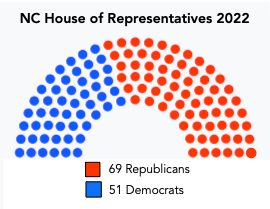
Image originally from Wikipedia, altered by T. Andrew Dykers to remove a vacant seat represented in gray.
But if Democrats, Republicans, and Independents were proportionately represented it would look like:
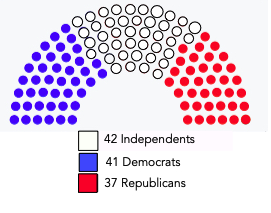
A variation of the Wikipedia graphic using data from the NC State Board of Elections.
You might say, “But, Independents have no organization, unified beliefs, or official platform.” That’s true, but as you can see, we have huge numbers and if the law treated Independent candidates equally by giving us a primary, Independents would start running for office. Successful candidates would meet one another and work together as they see fit. The fact that there is no official Independent Party or official platform makes no difference. Most Democrats and Republicans have never read their party’s platform and both parties offer a very broad spectrum of candidates in their respective “big tents.” While Independents do not have a party platform, we do have some unifying beliefs. I did some modest polling through SurveyMonkey and found Independents overwhelmingly prioritize ideas and character over political parties, and 100% agreed, “All candidates should play by the same rules.”
Despite my college degree and law license, until recently I did not know the history behind Independents being treated differently. During Jim Crow Segregation, Democrats and Republicans introduced signature collection obstacles as a tool to protect the two parties from the political growth of Blacks, Women, and Workers. The two parties understood the newly acquired voting power of Blacks and Women had to be harnessed or else it would be a threat. In 1929, NC Democrats and Republicans followed the lead of other states and secured their political power by requiring independents and new parties to collect large and arbitrary numbers of signatures to get onto the ballot.
For me to get onto the ballot as an Independent running for NC House district 56 I must collect 2,320 physical signatures, not digital. That number is arbitrary and daunting, and it’s the reason there are essentially zero Independents in office (anywhere). Since 1990, out of thousands of possible races only 16 Independents have collected enough signatures to get onto the ballot for NC House or Senate. You might be wondering how many Independents attempt to run for office…? No one knows that number because the state does not keep records of signature collection efforts. Before the signature collection hurdles were introduced, all contestants played by the same rules regardless of their political affiliation. These separate and unequal laws are the only ones you or I have ever known, and they have nothing to do with preventing frivolous candidates or overcrowded ballots, and everything to do with the Democratic and Republican parties maintaining their power.
Empowering Independents would largely remedy the vexing and destructive issue of rigged maps by busting-up the current power dynamic. It’s not impossible, but it becomes significantly more difficult to draw districts in a rigged manner when one must consider three equally sized groups instead of two. Below are three simple maps to help demonstrate the point. The first shows the top political affiliations in each county when Independents are not considered.
The second map shows the largest political affiliation in each county when Independents are considered.
The third map shows the top-two affiliations for each county. This map helps give a geographical sense of how widespread and heavily populated Independents are throughout the state. Empowering Independents would mitigate any one party’s ability to rig the maps. If we follow the sound principle that all people should be treated equally under the law, many of our functional ills will resolve.
The separate and unequal treatment of Independent voters and candidates is a fundamental flaw in our system; rooted in racism, sexism, and power. We need to empower Independents with equal rights so we can break gridlock, diffuse our rigged districts, steady the ship, and set ourselves on course for a re-United States of America. I’m running for NC House District 56 to raise awareness about the rights of Independents and how correcting the wrongs of the past can stabilize our present and help secure our future. Please visit Dykers4NCHouse.com to learn more and find out how you can help. Thank you!
(featured image via dykers4nchouse.com)
“Viewpoints” on Chapelboro is a recurring series of community-submitted opinion columns. All thoughts, ideas, opinions and expressions in this series are those of the author, and do not reflect the work or reporting of 97.9 The Hill and Chapelboro.com.




